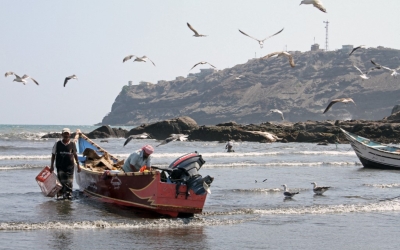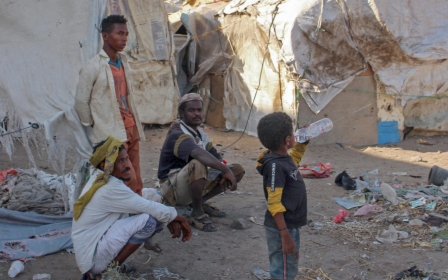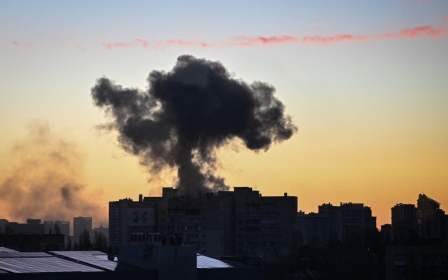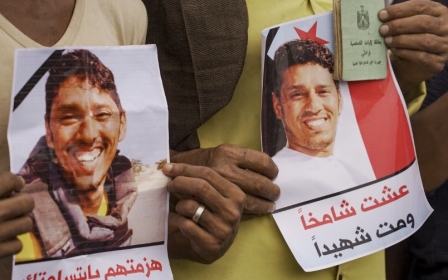Yemen: Cash-strapped labourers unable to spend Ramadan with families
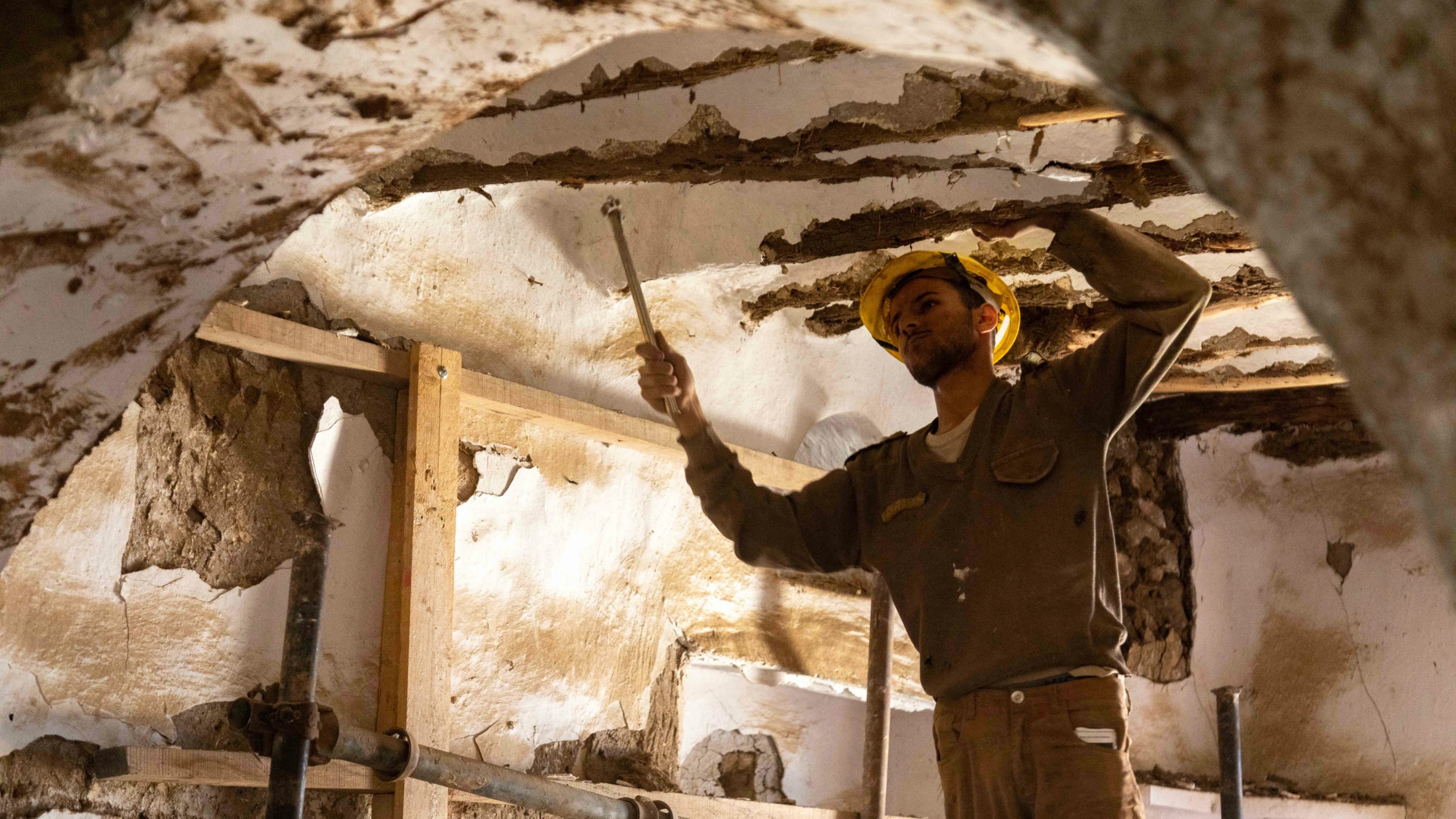
Carrying a bucket and a hammer, Khaled al-Qahiri’s pale face looks left and right, watching out for anyone looking to hire construction workers for a day or more.
Qahiri, a labourer in his 50s, has - along with dozens of other workers - been spending his days on one of the streets of Yemen's capital Sanaa hoping for work. Few contractors have been coming to the designated area lately, though.
When one does show up, the group of men instantly gather round him, eagerly offering their services, knowing that he may need just one worker.
“I’ve been coming to this market early every day for more than a month now, but I haven’t been lucky to be given work. I’ve only worked for two days in the last month,” Qahiri, who hails from Taiz, tells Middle East Eye.
“The chances of work were good three months ago, but since the fuel crisis began, opportunities have started to gradually disappear, with the prices of building materials rising to around double now.”
The costs of concrete, bricks, stones, water and other materials have increased due to fuel shortages that have impacted the production and transport of materials.
The price of 20 litres of fuel, which used to be 8,800 Yemeni riyal ($16) before the crisis, is now around YR30,0000 ($50).
Qahiri works in the capital all year round as a construction worker but usually spends the month of Ramadan and Eid holidays in a village in Taiz province, where his family lives.
Shielding loved ones
“This year, I will not be able to be with my family during Ramadan since I had to spend the money I had saved in the past two months. It is difficult to return to my wife and children empty handed,” Qahiri said, tears in his eyes.
“It will be my first Ramadan away from my family but there’s nothing to be done. Death would be better than this difficult life. I pray to God every day to either help me overcome this suffering or to let me die as I can no longer afford this hardship.”
Qahiri’s five children have been waiting for Ramadan to see him. He hasn't been able to tell them that actually, he won't be coming back.
“My children are waiting for gifts and new clothes when I’m back, but they aren’t aware of the situation and the lack of work here,” Qahiri says, unable to complete the interview.
'I will not tell them the truth: that I don’t have enough money to travel, but will say instead that I have to work - and hope to find work'
- Mahwiti, Yemeni labourer
Another labourer from Mahwit province, who asked to be called Mahwiti, says one reason many workers will not be returning home this month is that they want to shield their family from the reality of the situation they are in.
“When I arrive without gifts, my family will be sad, but I will send them the money. I still need to buy essentials for Ramadan, which I will be spending in Sanaa,” he tells MEE.
“I will not tell them the truth: that I don’t have enough money to travel, but will say instead that I have to work - and hope to find work.”
Mahwiti has already spent Ramadan twice in the capital, where he says they can find food for free, meaning he won't have to spend as much over the month.
“In Ramadan there are free meals offered in mosques and usually all labourers go to mosques to break their fast,” he says.
“Some generous people will also help us with money so I will stay here this Ramadan, but I hope I could travel home for Eid.”
Some 80 percent of Yemen's population of about 30 million people are in need of some kind of humanitarian assistance to survive, after seven years of a war that has directly and indirectly killed almost 380,000 people, according to the United Nations.
More than 17 million people currently require food aid in Yemen, but that number could rise to 19 million in the second half of the year, UN bodies, which are facing funding shortfalls, have said.
'Labourers are suffering'
Abdullah Ghanem, owner of a welding workshop in Sanaa, says that electricity costs have almost doubled in the past two months, while the price of iron has increased by a third.
The inflation has forced him to increase the cost of his services and products.
“Like all other workshops, I tried increasing the costs of windows, doors and other products but the result was that customers stopped requesting materials and services, thinking that prices will drop again,” Ghanem tells MEE.
'I’m sad about the workers and it is difficult to dismiss them before Ramadan because they need money to pay for their families’ needs, but I don’t have work for them'
- Abdullah Ghanem, workshop owner
Twelve workers used to work in his workshop but he was forced to let them all go since there is not enough work these days. Ghanem and his brother are the only ones working in the workshop now.
“I’m sad about the workers and it is difficult to dismiss them before Ramadan because they need money to pay for their families’ needs, but I don’t have work for them,” he adds.
Ghanem believes that his workers will not find other work during this difficult time. He hopes prices will drop and that he can re-employ them.
Hussein Qubati started building his house in Sanaa five months ago but as prices increased, he found himself unable to finish the work and was forced to pause.
“When I first started construction, I set a specific budget that was supposed to be enough to build the whole house, but the dramatic cost increase changed my plans. My money is no longer enough,” he said.
According to him, many people have paused construction work while they wait for prices to drop. “To build a house is a dream but it seems its fulfilment will not be near,” he told MEE.
Qubati says the only thing that still costs the same is the wages of labourers, and the lack of work means they are suffering.
Middle East Eye propose une couverture et une analyse indépendantes et incomparables du Moyen-Orient, de l’Afrique du Nord et d’autres régions du monde. Pour en savoir plus sur la reprise de ce contenu et les frais qui s’appliquent, veuillez remplir ce formulaire [en anglais]. Pour en savoir plus sur MEE, cliquez ici [en anglais].


